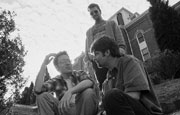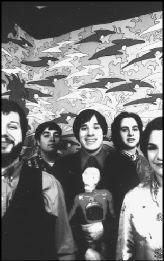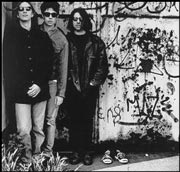JOSH ROSENFELD IS about as unusual a record company executive as you’ll ever meet. Sprawled behind the makeshift desk in his Central District home office, he confesses that he hates schmoozing and doesn’t like answering phone calls. He abhors doing publicity and, to make matters worse, just can’t seem to get the Minutemen song “Shit from an Old Notebook” out of his head.
Barsuk label showcase with This Busy Monster, Little Champions, and Abigail Grush
Crocodile, Wednesday, February 28
“Fuck advertising, commercial psychology. Psychological messages designed just to sell should be destroyed!” he sings, adding, “I always think about that line every time we do anything that’s even remotely [related to] advertising or marketing.”
It’s not that Rosenfeld is a bad businessman, but rather an unconventional one. For the past seven years, he’s been head of Seattle’s Barsuk Records, an independent record label that has defied convention and still managed to come out ahead.
Rosenfeld and friend Christopher Possanza founded Barsuk in 1994 with the intention of releasing records by their band, This Busy Monster. Inspired by other art-conscious labels like England’s 4AD, the pair hoped to create a brand name that audiences could consistently rely on for unique music and creatively packaged merchandise. In choosing which bands to sign, they moved according to their own tastes, often forgoing accessibility for the more obscure pop sounds they enjoyed personally.
“It’s important to me that we put out records that people like,” Rosenfeld explains. “But a big part of the idea behind Barsuk is that we don’t have to be totally constrained by that.”
Until two years ago, Barsuk recordings sold modestly, but everything changed when the label began working with Death Cab for Cutie. Since the release of that band’s 1999 debut, Something About Airplanes, and last year’s follow-up, We Have the Facts and We’re Voting Yes, Barsuk has blossomed into a financially stable and fiscally responsible enterprise, complete with marketing techniques, royalty checks, and publicists. More recently, the label has added two acts with preexisting national exposure—Bay Area singer-songwriter John Vanderslice and acclaimed rock trio Sunset Valley—to a stable that includes spirited indie-pop artists Little Champions and Abigail Grush.
While some might equate this sort of expansion with a label’s artistic death, Barsuk has been coping just fine. Rosenfeld has quit his day job, but the commercial success he’s achieved as a label owner hasn’t gone to his head, and it isn’t about to change his business tactics. Barsuk will continue as usual, upholding its commitment to the strange, the oddball, and the radio-unfriendly.
THIS OUTLOOK EXTENDS to the band. Since 1993, This Busy Monster singer-songwriter Possanza, bassist Rosenfeld, and drummer Barrett Wilke have worked outside the mainstream Seattle scene, perfecting a seamless blend of prog, post-punk, and ebullient pop that is anything but user-friendly. Everyone involved seems to unanimously agree that This Busy Monster will never be a cash cow. But in January, Barsuk released a five-song EP, The Curious Sofa, that’s surprisingly accessible, and in March, it will put out Fireworks, the band’s sophomore full-length.
Decidedly less rock-oriented than Like Icicles, its 1998 predecessor, Fireworks is a nearly brilliant record. Elegant horns, strings, and the occasional banjo add tasteful accents to gently strummed guitars—a departure from the band’s previous reliance on frenetic guitar noise. Rosenfeld attributes the musical shift to the departure of guitarist Jason Avinger, who amicably parted ways with the band two years ago. “He really drove a lot of the crazy, more aggressive, very dense guitar playing,” he explains. “Now that we’re more a trio, less space is being filled. It’s becoming more important not just to write things that are fun to play but that are more supportive of whatever song Christopher has written.”
As Possanza is a wildly divergent songwriter, that could be just about anything. On tracks like “Issue” and “What She Said,” his smooth tenor passes by in neurotic leaps and bounds, while on “Time to Sleep” and “Loup-Garou,” it practically tiptoes. Tempos change abruptly, and themes dissolve just as quickly as they are begun: He seems to come to each song outfitted in a different mood and mental state.
Rosenfeld readily acknowledges that this may make Fireworks a difficult listen for casual music fans. “Upon first listen, I think there are a handful of pop hooks and particular lyrics that might pop out at people,” he says. “But often, whole songs don’t become apparent for several listens.” (Not to mention that the record’s standout pop gem, “The Curious Sofa,” doesn’t appear until track 11.)
As a label head, Rosenfeld’s completely willing to sacrifice potential sales in order to guarantee the Barsuk reputation. If there is one thing he wants to continually reaffirm, it’s that the twin beacons of artistic integrity and commercial viability are not mutually exclusive.
“I’ve recognized it is a labor of love,” he says. “It’s love for the music and the people who are making it, but they need to support themselves. It’s a sad thing, but it’s becoming less sad to me. I’m very confident that I’ll be able to run the business in a way that, even as it becomes more businessy, it’s just going to incorporate business savvy into the idealism that started it.”








